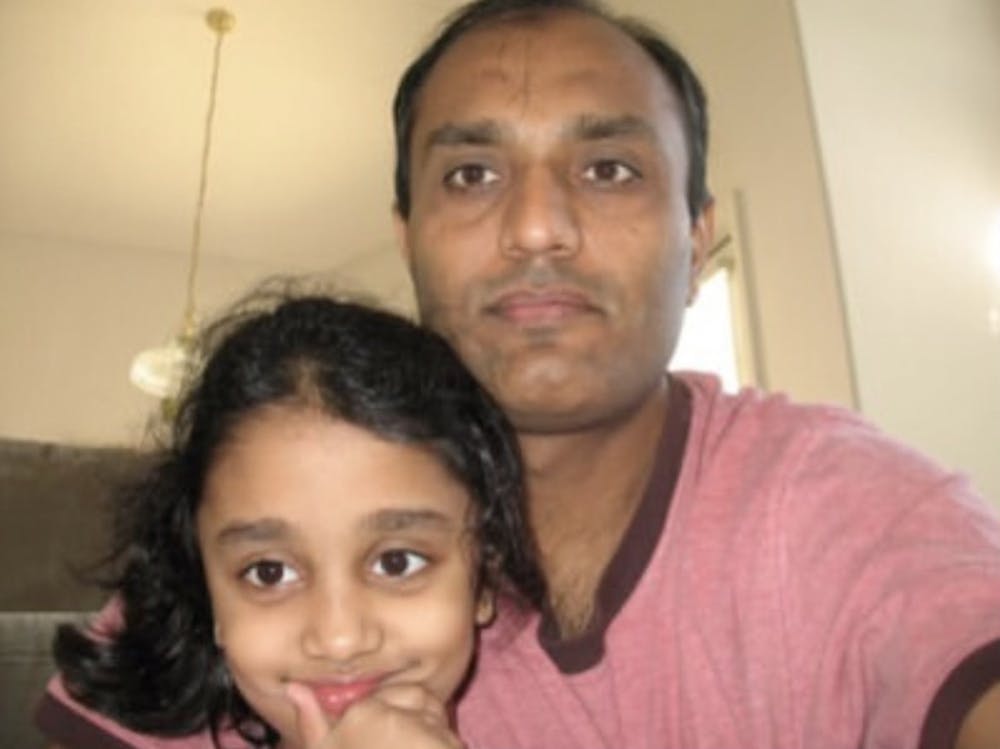
Growing up, I didn’t spend much time with my dad. I’d see him early in the mornings, sitting with his cup of chai and a book, before he made his way to work and I made my way to school. He’d come home from work around 9 p.m., which was well past the time when my brother, mom and I would eat dinner, but we’d all sit with him at the dining table — he would eat dinner while the rest of us picked at a bowl of dates. At night, he’d be doing work in the study or living room, and I’d be watching my own shows on my laptop a few feet away. My dad is not a particularly talkative or open person, so our relationship developed at a distance and moved in silence.
To be honest, it’s complicated. As a child, I craved the typical father-daughter relationship I saw with my friends and in movies: father-daughter dances, traditions and weekly routines. I hate to bring up the immigrant experience, but to my dad, a Hollywood father-daughter relationship was not the norm.
To him, nothing sounded more annoying than sitting in an elementary school cafeteria eating dry doughnuts and conversing with other dads and their PTA wives; I can’t remember wanting to experience anything more. A man of resilience, my dad bore the weight of being the eldest son in his family and immigrating to America alone. At times, it seems he still forgets that everyone deserves a childhood, having missed out on his own.
The warmth of a father's embrace, the laughter shared over inside jokes, the guidance offered in moments of uncertainty — these were things I yearned for but struggled to find in my relationship with my dad.
Instead, our connection was built on quiet moments and unspoken gestures. It was in the way he would always leave a cup of chai for me in the mornings or how he would glance over at me from his work in the evenings, a silent acknowledgment of my presence. With time, I began to notice these glimpses of his love buried beneath his layers of stoicism. It took me a very long time to understand that my dad loves me, even though he never really knew how to show it.
While I didn’t grow up with forehead kisses and hugs before exams, I did grow up with him texting me a morning prayer and a selfie of him praying for me at our home temple. I didn’t have a weekly tradition with my dad, but he did check in on me every night in my room, looking out my window with his arms clasped behind his back. He never really liked watching movies, but eating a bowl of cereal and watching cricket was something we enjoyed together. His love may not have been expressed in the conventional ways I had hoped for, but it is something I have learned to appreciate and miss at school.
Around three weeks ago, my dad stopped by in Baltimore before his annual trip to India. It was the first time he was visiting my row home, my big girl house. I didn’t know how to feel when I gave him a tour of the three floors and my room, a space that I had begun to call my home. It’s a different type of pain to refer to your college dorm or house as home to your parents over the phone. It’s an even greater pain to show them the space you have cultivated as your own since moving from your childhood home. I wonder if it hurt him too when I explained to him my grocery schedule, my commute to campus and my favorite spots around town.
Otherwise, aside from my dad’s brief text messages asking if I’m eating or need more medication, I don’t speak to him much at college. There isn’t really a way for me to replace our evenings of simply being in the same room together. I do, however, spend much of my dinner calling my mom from my room as I push around the remains of semi-soggy leftovers. The conversations generally go as follows: she asks how I’m doing, and I give her the usual, “I’m doing alright.” I tell her how disgusting the food I’m eating is, and then she goes on to tell me all the new neighborhood tea that has transpired since I’ve been gone.
Recently, however, after my dad’s visit to Baltimore, I had to stop in response to the question. Do I tell her that I am truly and utterly exhausted and overwhelmed? So much so that I think I’m working too hard and don’t know how to stop. I just really need a forehead kiss and a big hug from her, and an evening of simply sitting in the living room with my dad.
Before I can decide, the words stumble from my lips: “I miss you and Dad.” Almost immediately, tears spring into my eyes.
My mom laughs. “Do you know he cried recently because of how much he missed you?”
I suddenly felt my heart start to ache. I didn’t know whether to smile or cry. The sandwich in front of me blurs into a mess of brown, then comes back into focus as tears trickle down my cheeks.
I cleared my throat.
“No, I didn’t know that.”
Aashi Mendpara is a junior from Orlando, Fla. studying Neuroscience and Anthropology.





